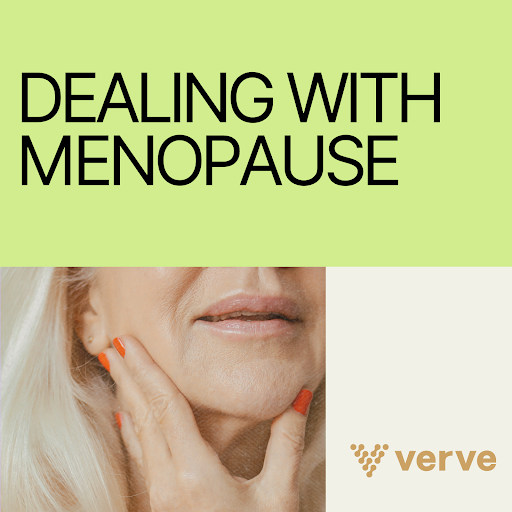As women enter their 40s and 50s, the challenge of balancing work, family and personal well-being often comes into focus. But amid these demands, an inevitable change looms: menopause.
With more than 85% of women Symptoms such as hot flashes, mood swings, and sleep disturbances [1]Menopause is not just a phase, it is an important life transition.
However, a survey found that more than 90% of postmenopausal women have never received education about menopause in school, and more than 60% of women only start seeking information about menopause after symptoms appear. [2]
Realizing there’s still a critical need for guidance, the wellness experts at Verve have put together the essential tips every woman over 40 should know to manage menopause and thrive in midlife.
Diet Checklist: Essential Nutrients for Menopause
Diet plays a crucial role during menopause, as it can significantly affect how women experience this transitional phase. As estrogen levels drop, the risk ofe Increased osteoporosis, heart disease, and weight gain. A balanced diet rich in essential nutrients can help mitigate these risks by supporting bone density, regulating mood, controlling weight and maintaining overall health.
Proper nutrition can also relieve common menopausal symptoms such as hot flashes, fatigue and joint pain, making it an important part of a healthy lifestyle during this time.
- calcium: Supports bone density, which may decrease during menopause due to lower estrogen levels.
- Vitamin D: Aids in calcium absorption, essential for bone health, especially after menopause when the risk of osteoporosis is increased.
- magnesium: Helps with sleep, mood regulation and bone health, and resolves common menopausal symptoms such as insomnia and irritability.
- Vitamin K: Works with calcium and vitamin D to support bone health and may help reduce the risk of fractures.
- Omega-3 fatty acids: Reduces inflammation, supports heart health, and may help relieve menopausal symptoms like hot flashes.
- Vitamin B6: Regulates mood by helping produce serotonin, which decreases during menopause.
- Vitamin B12: Supports neurological function and energy levels that may be affected during menopause.
- zinc: Helps with immune function and supports skin health when hormone levels fluctuate.
- Folic acid (vitamin B9): Supports heart health and aids in mood regulation, which is important as menopause increases the risk of cardiovascular problems.
- iron: Although iron needs decrease after menstruation stops, it is still important for preventing anemia and maintaining energy levels.
- Phytoestrogens: These plant-based compounds found in soybeans and flaxseeds can mimic estrogen in the body and may help manage menopausal symptoms.
- collagen: Helps maintain skin elasticity and joint health, which may be affected by reduced estrogen.
- Probiotics: Supports gut health, which can be disrupted during menopause, potentially affecting digestion and weight management.
- fiber: Aids digestion, helps with weight control, and may reduce the risk of heart disease, which becomes more of a concern after menopause.
- Antioxidants (such as vitamins C and E): Prevents oxidative stress and supports skin health, which declines as estrogen levels decrease.
Life style tips
- Prioritize sleep: High-quality sleep is crucial, especially during menopause, when sleep disorders are common. Aim for 7-9 hours of restful sleep each night to help regulate mood, manage weight, and support overall health. Creating a calming bedtime, limiting screen time before bed, and maintaining a consistent sleep schedule can have dramatic results.
- stay hydrated: Drinking plenty of water is crucial to managing menopausal symptoms like hot flashes and dryness. Adequate hydration also supports skin health, digestion and energy levels. Drink at least 8 glasses of water a day, and consider herbal teas or water-rich foods like cucumbers and watermelon.
- Reduce stress: Managing stress is essential for hormonal balance and overall health. Chronic stress can exacerbate symptoms such as mood swings, insomnia, and fatigue. Incorporate stress-reducing practices like meditation, deep breathing exercises, yoga, or spending time in nature. Regular physical activity can also help reduce stress levels and improve mood.
- Talk to family and friends: Emotional support is key during this time of change. Openly discussing your experience with a trusted family member or friend can ease and reduce feelings of isolation. Consider joining a support group where you can share and learn from others who have been through similar experiences.
- Check for symptoms: Regular check-ups are crucial, especially if you develop new symptoms or if your symptoms get worse. Conditions like osteoporosis and cardiovascular disease become more common during menopause, so it’s important to monitor bone density, heart health, and brain health. If you are experiencing memory problems, significant mood changes, or unusual physical symptoms, see a health care provider to rule out any underlying medical conditions and get personalized advice on managing your health.
How Verve can support your menopause journey
Verve offers a variety of help and solutions for the problems that come with menopause.
For example, Verve V80 – “Transparent Green” contains 80 ingredients including 100% NRV of all essential vitamins, multiple minerals, antioxidants, adaptogens, probiotics and more.
The best thing about Verve is that it’s 100% transparent, which means you know exactly how much of each ingredient is in the mix without having to rely on blind trust.
For more information, visit https://vavaverve.com/
About Shen Yun
Founded by My Protein® founder Oliver Cookson, Verve’s mission is to simplify nutrition and solve the most common health challenges, including sleep, energy, gut health and more. As a comprehensive health brand, Verve is committed to helping you become your best self through daily healthy habits. Our commitment to transparency means you can trust every ingredient we use, knowing that nothing is hidden and everything is designed with your health in mind. With Verve, we make optimal health accessible and simple, so you can focus on living your best life.
source
[1] https://www.ncbi.nlm.nih.gov/books/NBK285446/#:~:text=During%20menopause%2C%20approximately%2085%20percent,of%20variing%20type%20and%20severity.&text=Types% % %20%20 of 20 %20 people experience %20 symptoms, which %20 include the following %20 symptoms.
[2] An online survey of postmenopausal women to determine… National Institutes of Health (NIH) (.gov) https://www.ncbi.nlm.nih.gov › Articles › PMC10273865

